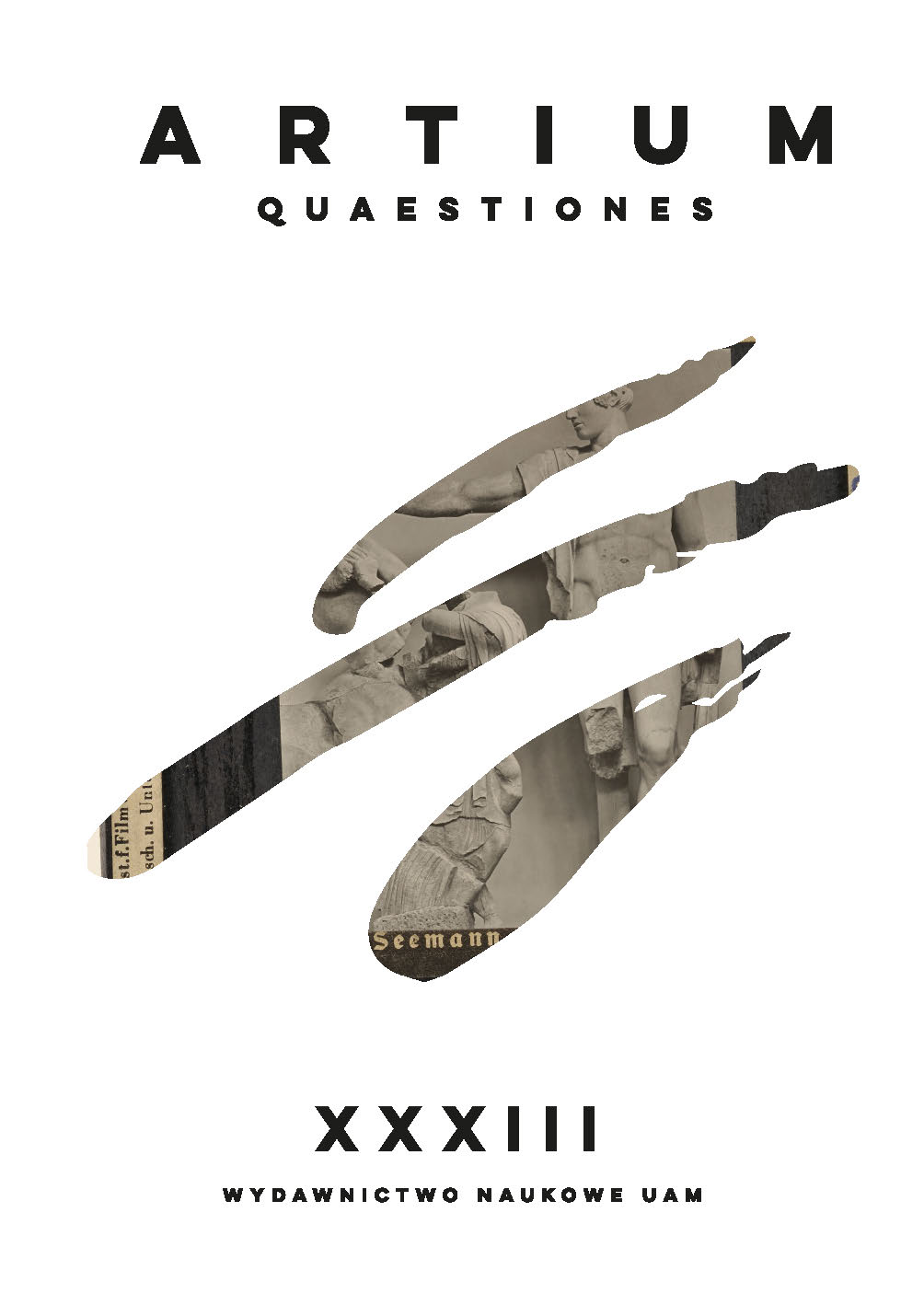Abstrakt
The article focuses on the notion of the image of self-shadow in American photography in the second half of the twentieth century, understood as a shadow silhouette of the creator captured in a photograph. The two main problems that concern the author’s research are the lack of current, theoretical study on the problem of shadow in the history of photography from the perspective of art history (V. Stoichita, R. Casati, P. Cavanagh, H. Kanaan) and the lack of the definition of the phenomenon of self-shadow and its possible types in self-portraiture. The author’s proposition of a definition of self-shadow is based on selected photographs by four artists whose works touch upon the problem of shadow in the context of relations between the “self” and the “other” (Lee Friedlander), race and subjective invisibility (Shawn W. Walker), mask and the other-self (Andy Warhol), and the intimate recording of identity (Nan Goldin). In her analyses, the author discusses the problem of the hybrid ontology of the shadow, which is both visible and visual. In this understanding, the shadow not only refers to a physical body, present “here and now” but more importantly evokes a sense of presence, even when the artist’s body is absent in the picture. The double index refers to the image leaving its mark both in reality and on light-sensitive paper. The rudimentary, vitalistic relation linking the human body with its shadow is only a starting point for analyses of the complexity of its status and symbolism. The concepts framing Andy Warhol’s Polaroid are twinning, the mask, and the Jungian theory of the shadow archetype. To discuss the self-portrait of Shawn W. Walker, the author applies the literary-philosophical concept of invisibility based on writings from Black existentialists (W.E.B. Du Bois, F. Fanon, R. Ellison). The analyses of Lee Friedlander’s photograph have been based on the psychological distinction between the figures of the “self” and the “other”. The closing concepts that frame Nan Goldin’s self-portrait are the haptic thinking subject (M. Smolińska) and the notion of a diary. The critical apparatus of the study is supplemented by contemporary analyses of the myth of Narcissus, the mythical origins of the self-portrait, and the notion of the index (after R. Krauss, M. Michałowska, M.A. Doane).
Bibliografia
Baker G., "The Space of the Stain", Grey Room 2001, 5, pp. 7-37 https://doi.org/10.1162/152638101317127796 DOI: https://doi.org/10.1162/152638101317127796
Barthes R., Camera Lucida: Reflections on Photography, trans. R. Howard, New York 1981
Baxandall M., Shadows and Enlightenment, New Haven-London 1995
Belting H., Face and Mask: A Double History, trans. T.S. Hansen, A.J. Hansen, Princeton 2017 https://doi.org/10.1515/9780691244594 DOI: https://doi.org/10.1515/9780691244594
Bhabha H., The Location of Culture, London 2004
Bowyer S., "Seeing Double: The Subject of Vision in Lee Friedlander's Self-Portraiture", photographies 2020, 13(3), pp. 323-339 https://doi.org/10.1080/17540763.2020.1779791 DOI: https://doi.org/10.1080/17540763.2020.1779791
Burgin V., "Looking at Photographs", in: Thinking Photography, ed. V. Burgin, London 1982, pp. 142-153 https://doi.org/10.1007/978-1-349-16716-6_7 DOI: https://doi.org/10.1007/978-1-349-16716-6_7
Buse P., The Camera Does the Rest. How Polaroid Changed Photography, Chicago 2016 https://doi.org/10.7208/chicago/9780226312163.001.0001 DOI: https://doi.org/10.7208/chicago/9780226312163.001.0001
Casati R., P. Cavanagh, The Visual World of Shadows, Cambridge, Massachusetts 2019 https://doi.org/10.7551/mitpress/11007.001.0001 DOI: https://doi.org/10.7551/mitpress/11007.001.0001
Cotton C., The Photograph as Contemporary Art, London 2004
De Duve T., R. Krauss, "Andy Warhol, or The Machine Perfected", October 1989, 48, pp. 3-14 https://doi.org/10.2307/778945 DOI: https://doi.org/10.2307/778945
Didi-Huberman G., "The History of Art Within the Limits of Its Simple Practice", in: Confronting Image: Questioning the Ends of a Certain History of Art, trans. J. Goodman, Pennsylvania 2004, pp. 11-52
Doane M.A., "Indexicality: Trace and Sign: Introduction," Differences: A Journal of Feminist Cultural Studies 2007, 1(18), pp. 1-6 https://doi.org/10.1215/10407391-2006-020 DOI: https://doi.org/10.1215/10407391-2006-020
Doane M.A., "The Indexical and the Concept of Medium Specificity", Differences: A Journal of Feminist Cultural Studies 2007, 1(18), pp. 128-152 https://doi.org/10.1215/10407391-2006-025 DOI: https://doi.org/10.1215/10407391-2006-025
Eckhardt S.L., "An Introduction to Working Together", in: Working Together: Louis Draper and the Kamoinge Workshop, ed. S. Eckhardt, Durham 2020, pp. 9-15
Fanon F., Black Skin, White Masks, trans. C.L. Markman, London 1986
Foster H., "The Return of the Real", in: The Return of the Real. The Avant-Garde at the End of the Century, Cambridge-London 1996
Goldin N., The Ballad of Sexual Dependency, New York 1986
Gombrich E.H., The Depiction of Cast Shadows in Western Art, London 1995
Jung C.G., Man and His Symbols, New York-London-Toronto-Sydney-Auckland 1964
Kanaan H., Photography and Its Shadow, Palo Alto 2020 https://doi.org/10.1515/9781503611382 DOI: https://doi.org/10.1515/9781503611382
Kanicki W., Ujemny biegun fotografii. Negatywowe obrazy w sztuce nowoczesnej, Gdańsk 2016
Krauss R., "Notes on the Index: Seventies Art in America", October 1977, 3, available online: <https://doi.org/10.2307/778437>, pp. 68-81 DOI: https://doi.org/10.2307/778437
Lacan J., Seminar IX: Identification, London 2002
Michałowska M., Obraz utajony. Szkice o fotografii i pamięci, Cracow 2007
Ovid, Metamorphoses, trans. A.S. Kline, Virginia 2004
Patnaik D.P., “Diasporic Double Vision, in: Committed to the Image”, Contemporary Black Photographers, ed. B. Head Millstein, New York 2001, pp. 29–39
Plato, The Republic, trans. D. Lee, London 2007
Pliny, The Natural History, Book XXXV, trans. H. Rackham, London 1952
Silverman K., The Threshold of the Visible World, New York–London 1996
Smolińska M., “Efekt Narcyza. Metanarcyzm w sztuce wideo(instalacji)”, in: Projekt Narcyz, ed. A. Bednarczyk, Cracow 2017, pp. 172–192
Smolińska M., Haptyczność poszerzona. Zmysł dotyku w sztuce polskiej drugiej połowy XX i początku XXI wieku, Cracow 2020
Stoichita V., A Short History of the Shadow, trans. A.M. Glasheen, London 1997
Swenson G., “What is Pop Art? Answers from 8 Painters”, Art News 1963, 62, p. 26
Walker S.W., Shadows and Reflections/Self-Portraits, Artist’s Statement, 1996, courtesy of the artist, pp. 1–2
Licencja

Utwór dostępny jest na licencji Creative Commons Uznanie autorstwa – Użycie niekomercyjne – Bez utworów zależnych 4.0 Międzynarodowe.
Prawo autorskie regulowane jest oświadczeniem autora przygotowanym przez Wydawnictwo Naukowe UAM a od nr XXVIII także umową licencyjną na publikację online zawartą pomiędzy Autorem i Uniwersytetem im. Adama Mickiewicza. Autorzy ponoszą odpowiedzialność za oryginalność zamieszczanego materiału tekstowego oraz regulację praw autorskich dotyczących materiałów ilustracyjnych. W przypadku, gdy materiały pochodzą od redakcji – odpowiedzialność ponosi redakcja czasopisma.
Ten utwór dostepny jest na licencji Creative Commons Uznanie autorstwa - Użycie niekomercyjne - Bez utworów zależnych 4.0 Międzynarodowe.

